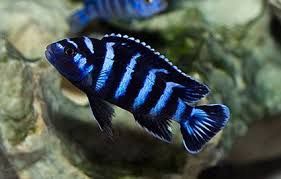Demasoni Malawi Cichlid
R80.00
In stock
Save this product for later
Demasoni Malawi Cichlid
Product Details
Malawi cichlids are beautiful, colourful fish native to Lake Malawi in East Africa. They are known for their vibrant colours, dynamic personalities, and unique behaviours. Keeping Malawi cichlids can be rewarding, but they require specific care due to their unique environmental needs and social dynamics.
Tank Size
- Minimum Size: 200 litres for a small group. Larger tanks are preferred (280 litres or more) as Malawi cichlids can be territorial.
- Reason: These fish are highly active and territorial. The larger the tank, the more space they have to establish their territories, which reduces aggression.
Water Parameters
- Temperature: 24°C to 28°C
- pH: 7.8 to 8.6 (Malawi cichlids prefer alkaline water)
- Hardness: 10-20 dGH (they thrive in hard water)
- Ammonia/Nitrite: 0 ppm (extremely toxic to cichlids)
- Nitrate: < 20 ppm (nitrates should be kept low through regular water changes)
Aquascaping
- Rockwork and Hiding Places: Malawi cichlids are territorial, so it’s important to create plenty of rock formations, caves, and hiding spots. This mimics their natural habitat in Lake Malawi, which has rocky environments.
- Substrate: Sand or fine gravel is preferred, as many Malawi cichlids like to dig.
- Plants: Be cautious with plants, as most Malawi cichlids will dig them up or eat them. Consider using hardy, tough plants like Anubias or Java Fern, which can be attached to rocks and wood.
Diet
- Mbuna (rock dwellers): Primarily herbivorous. Feed them high-quality spirulina-based pellets, algae wafers, and blanched vegetables (such as zucchini or spinach).
- Haplochromis and Aulonocara (Peacocks): More carnivorous, so they require a diet rich in proteins like frozen or freeze-dried brine shrimp, bloodworms, and high-quality cichlid pellets.
- Important Note: Avoid feeding them too much protein if they are herbivorous species, as it can lead to bloat (a common and serious health issue).
Tank Mates
- Species Compatibility: Malawi cichlids are best kept with other Malawi species of similar temperament. Mbuna, Peacocks, and Haps all have different levels of aggression and behavior, so research is necessary to choose compatible species.
- Aggression Management: Overcrowding (in a large enough tank) can help reduce aggression by spreading it out, but this requires careful maintenance and filtration.
Filtration and Maintenance
- Filtration: Malawi cichlids produce a lot of waste, so a strong filtration system is necessary. Canister filters or high-quality hang-on-back filters with biological and mechanical filtration are recommended.
- Water Changes: 25-30% weekly water changes are essential to maintain water quality.
- Aeration: Provide good water movement and surface agitation, as Malawi cichlids prefer well-oxygenated water.
Behavior and Territoriality
- Aggression: Malawi cichlids, especially Mbuna, can be quite aggressive. They establish territories and will defend them vigorously. It’s important to observe your tank dynamics and be prepared to rearrange rocks or separate fish if needed.
- Hierarchy: Establishing a clear social hierarchy is part of their natural behavior. Larger or more dominant males will often display more vibrant colors to assert dominance.
Breeding
- Mouthbrooders: Most Malawi cichlids are mouthbrooders, meaning the female will carry the fertilized eggs in her mouth until they hatch (usually around 21-28 days). Breeding can be encouraged by maintaining excellent water quality and proper diets.
- Separate Breeding Tanks: If breeding is desired, it's best to provide a separate tank for the female once she begins carrying eggs. This prevents stress and aggression from other fish.
Lighting
- Moderate Lighting: Malawi cichlids do not require intense lighting. Standard aquarium lights are fine. Excessive lighting can encourage algae growth, which is beneficial for herbivorous Mbuna but can make the tank harder to maintain.
Common Health Issues
- Malawi Bloat: A common ailment, often caused by improper diet (too much protein for herbivores) or poor water quality. Symptoms include swelling, lethargy, and loss of appetite. Treatment involves fasting the fish and administering anti-parasitic medication.
- Ich (White Spot Disease): Malawi cichlids are susceptible to ich, especially when stressed. It can be treated with temperature elevation and ich medication.
Key Takeaways
- Malawi cichlids require a large tank with rock formations to reduce aggression.
- Maintain alkaline, hard water with excellent filtration and aeration.
- Carefully select tank mates and monitor territorial behavior.
- Feed species-appropriate diets to avoid health problems.
Malawi cichlids are stunning additions to any aquarium, and with the right care, they can thrive and showcase their vibrant personalities.
Display prices in:ZAR

